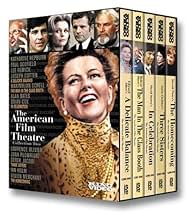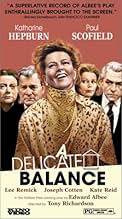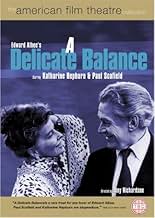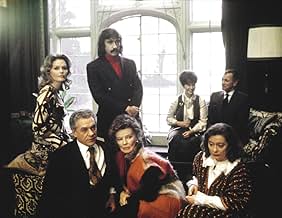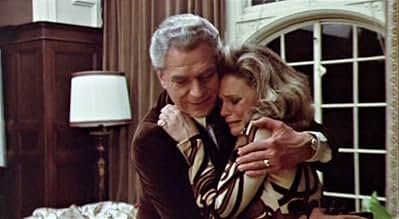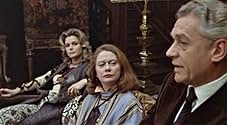A well-to-do Connecticut family is upended when the grown daughter's godparents, seized by a nameless terror, decide to come live with them.A well-to-do Connecticut family is upended when the grown daughter's godparents, seized by a nameless terror, decide to come live with them.A well-to-do Connecticut family is upended when the grown daughter's godparents, seized by a nameless terror, decide to come live with them.
- Awards
- 1 nomination total
Featured reviews
In Connecticut, Agnes and Tobias (Katharine Hepburn and Paul Scofield) are an upper-class married couple whose relationship has been uneasy for many years, since at least the time their son died; but they've managed to find a certain comfortable pattern of uneasiness. Agnes's sister, Claire (Kate Reid), lives with them and insists that her perpetual drinking is not alcoholism but willfulness. Their daughter, Julia (Lee Remick), poised to have her fourth divorce, has come back home. Unexpectedly, her room has been taken over by Harry and Edna (Joseph Cotten and Betsy Blair), best friends of Tobias and Agnes. Seized by a nameless terror that propelled them out of their own house, Harry and Edna have decided to stay.
The slightly elliptical nature of this material is more annoying than fascinating, but there's still plenty of interest and plenty of opportunity for a team of terrific actors to do their thing. Yet another great Katharine Hepburn performance preserved on film is yet another reason for us to be grateful, but Paul Scofield and Kate Reid have left fewer of their performances for posterity; and so it's nice we have this film, which gives each a fully realized character to play.
"A Delicate Balance" is a play by Edward Albee, produced by the American Film Theatre with no alterations and no foolish attempts to open it up. Alfred Hitchcock proved several times that a limited space can be an asset to a movie; and while the film making here is not at his level, Tony Richardson does a nice job at directing our eye and staying out of the play's way.
The slightly elliptical nature of this material is more annoying than fascinating, but there's still plenty of interest and plenty of opportunity for a team of terrific actors to do their thing. Yet another great Katharine Hepburn performance preserved on film is yet another reason for us to be grateful, but Paul Scofield and Kate Reid have left fewer of their performances for posterity; and so it's nice we have this film, which gives each a fully realized character to play.
"A Delicate Balance" is a play by Edward Albee, produced by the American Film Theatre with no alterations and no foolish attempts to open it up. Alfred Hitchcock proved several times that a limited space can be an asset to a movie; and while the film making here is not at his level, Tony Richardson does a nice job at directing our eye and staying out of the play's way.
Director Tony Richardson's presentation of "A Delicate Balance" could be dismissed for it's lack of edginess and it's gentrified (albeit screwed up) characters. It is also what critics would call a "stagy" film. Yet it is redeemed from this dour damnation because of Albee's wonderful way with words, the rich cinematography, and exceptional acting, exceptionally well cast: Katherine Hepburn, Paul Scofield, Lee Remick, Joseph Cotton.
For those looking for a violent film -- not in the form of bullets or explosions -- but of verbal surgical strikes, this is it. Edward Albee's dialogue provides all the female (yes, this would be considered a "woman's movie") protagonists and antagonists (one wonders at times which is which) a laser like aim against their primary targets: other women. And it is done under a guise of "civility"; sometimes, with a smile.
The stand-out among these veteran actors is Kate Reid, who plays Claire, the alcoholic in-law who at times gives the most voice to the story, set amid a dysfunctional Connecticut family. But even her performance can't out weigh the constant barrage of verbal cross-fire from her friends and in-laws. Yet the twist here is that the aggressors are the women, while the men attempt to keep the peace as best they can -- only firing back if attacked by the females.
This isn't a film for everyone; it's definitely the stuff of classic drawing room (psycho) drama. But for those who can appreciate consummate acting armed with deft dialogue, make yourself a nice cup of tea -- spiked with a shot or two of brandy -- and check this out.
For those looking for a violent film -- not in the form of bullets or explosions -- but of verbal surgical strikes, this is it. Edward Albee's dialogue provides all the female (yes, this would be considered a "woman's movie") protagonists and antagonists (one wonders at times which is which) a laser like aim against their primary targets: other women. And it is done under a guise of "civility"; sometimes, with a smile.
The stand-out among these veteran actors is Kate Reid, who plays Claire, the alcoholic in-law who at times gives the most voice to the story, set amid a dysfunctional Connecticut family. But even her performance can't out weigh the constant barrage of verbal cross-fire from her friends and in-laws. Yet the twist here is that the aggressors are the women, while the men attempt to keep the peace as best they can -- only firing back if attacked by the females.
This isn't a film for everyone; it's definitely the stuff of classic drawing room (psycho) drama. But for those who can appreciate consummate acting armed with deft dialogue, make yourself a nice cup of tea -- spiked with a shot or two of brandy -- and check this out.
Probably were it not for the American Film Theater, that noble project which ultimately did fail of bringing productions of classical American works to film, we might never have seen A Delicate Balance. It's like a lot of O'Neill's work, it's all in the creation of the characters.
Certainly a play which consists of six characters sitting around and talking would not be considered anything film-able today. A Delicate Balance for me seems to take off in the same directions as Edward Albee's other classic, Who's Afraid of Virginia Woolf and also bears no small resemblance to O'Neill's Long Day's Journey Into Night.
Both of those films however had bigger budgets and were made more cinematic by having the players move into various locations. The one set technique just doesn't work here. This is not for instance a story as gripping as Alfred Hitchcock's Rope or Rear Window. My guess is that the budget was blown on getting the high priced stars.
Paul Scofield and Katharine Hepburn play a pair of sixty somethings married and living in a posh Connecticut suburb, the kind of place Hepburn grew up in and knew well. Living with them is Hepburn's leach of a sister Kate Reid who they keep well supplied with alcohol and who lives there at Hepburn's insistence. Otherwise Scofield would have tossed this one out with the trash years ago. But he bows to Hepburn's wishes to keep peace and order, a delicate balance if you will.
They get two intruders in their well ordered lives one day. Their neighbors and long time friends, Joseph Cotten and Betsy Blair just ring the bell and announce that something unknown has frightened them in their home and they need to move out and move in with them. Scofield offers them his daughter's room.
But then daughter announces she's moving back after failed marriage number four. Needless to say that causes the balance to go out of whack. Lee Remick is the daughter and she's a selfish and spoiled suburban princess. After this everybody grates on each other's nerves.
Short and on plot, but deep on characterization is A Delicate Balance. It explores the problems of old age and loneliness. Cotten and Blair have no children and Scofield and Hepburn take little comfort in Remick. Perhaps if there were grandchildren things might be different for both couples. There was a son who died for Hepburn and Scofield and that seems to have cast a permanent pall over both of them.
Though Remick is blood kin, Hepburn and especially Scofield have more in common with their neighbors. How it all works out is for you to see A Delicate Balance for.
The film's saving grace is the wonderful performances by the cast. The original Broadway production ran for 132 performances in 1966-1967 and starred Hume Cronyn and Jessica Tandy in the Scofield-Hepburn roles. But certainly Kate and Paul were going to sell more tickets than either of the other two worthy players.
Not that A Delicate Balance did much business back in the day. These films were for limited release in any event and if it's making money it's now in video sales and rentals. Still we can thank the American Film Theater for its preservation with some of the best preservers around.
Certainly a play which consists of six characters sitting around and talking would not be considered anything film-able today. A Delicate Balance for me seems to take off in the same directions as Edward Albee's other classic, Who's Afraid of Virginia Woolf and also bears no small resemblance to O'Neill's Long Day's Journey Into Night.
Both of those films however had bigger budgets and were made more cinematic by having the players move into various locations. The one set technique just doesn't work here. This is not for instance a story as gripping as Alfred Hitchcock's Rope or Rear Window. My guess is that the budget was blown on getting the high priced stars.
Paul Scofield and Katharine Hepburn play a pair of sixty somethings married and living in a posh Connecticut suburb, the kind of place Hepburn grew up in and knew well. Living with them is Hepburn's leach of a sister Kate Reid who they keep well supplied with alcohol and who lives there at Hepburn's insistence. Otherwise Scofield would have tossed this one out with the trash years ago. But he bows to Hepburn's wishes to keep peace and order, a delicate balance if you will.
They get two intruders in their well ordered lives one day. Their neighbors and long time friends, Joseph Cotten and Betsy Blair just ring the bell and announce that something unknown has frightened them in their home and they need to move out and move in with them. Scofield offers them his daughter's room.
But then daughter announces she's moving back after failed marriage number four. Needless to say that causes the balance to go out of whack. Lee Remick is the daughter and she's a selfish and spoiled suburban princess. After this everybody grates on each other's nerves.
Short and on plot, but deep on characterization is A Delicate Balance. It explores the problems of old age and loneliness. Cotten and Blair have no children and Scofield and Hepburn take little comfort in Remick. Perhaps if there were grandchildren things might be different for both couples. There was a son who died for Hepburn and Scofield and that seems to have cast a permanent pall over both of them.
Though Remick is blood kin, Hepburn and especially Scofield have more in common with their neighbors. How it all works out is for you to see A Delicate Balance for.
The film's saving grace is the wonderful performances by the cast. The original Broadway production ran for 132 performances in 1966-1967 and starred Hume Cronyn and Jessica Tandy in the Scofield-Hepburn roles. But certainly Kate and Paul were going to sell more tickets than either of the other two worthy players.
Not that A Delicate Balance did much business back in the day. These films were for limited release in any event and if it's making money it's now in video sales and rentals. Still we can thank the American Film Theater for its preservation with some of the best preservers around.
After seeing this I tried to figure out why it is considered at all above the ordinary. The characters are: a domineering wife, a docile husband, an alcoholic sister, a daughter working on her fourth divorce, friends in a crisis of anxiety. I suppose this exaggerated mix is interesting to a playwright, but maybe not to an audience, at least to this member of the audience. My interest flagged while spending over two hours watching these unhappy people work through their long-standing problems.
Katharine Hepburn as Agnes, the wife, is, well, Katharine Hepburn. That is good as far as it goes, but her performance here seemed overly rehearsed--every body movement and spoken line struck me as anything but spontaneous. If I had not known that it was Paul Schofield as Tobias, the husband, I would not have found his performance all that remarkable. Kate Reid's performance as Claire, Agnes' alcoholic sister, might play well on stage, but here it struck me as embarrassingly overacted, perhaps exaggerated by the extreme close-ups and silly script elements like the accordion playing. Lee Remick did add some spark as Julia, the much-divorced daughter. Betsy Blair, as Edna, a supposed friend, gave little indication why Agnes and Tobias should find her of value (not sure if this was a result of her performance or the script). Joseph Cotton, as Harry, Edna's husband, turned in the most sincere performance, making me think that he has been under-appreciated as an actor.
I liked the question raised of when love for friends equals, or even trumps, inherent family bonds. This play gives credence to Robert Frost's quote, "Home is the place, when you have to go there, they have to take you in," and submits that this quote is not as nearly a given when applied to friends.
I found some character behaviors unfathomable. Consider Julia's reaction to Harry and Edna's taking over her bedroom. She was insulted by this from the beginning, but about midway through the play she went ballistic and finally flew upstairs in a rage. Later Harry reported that Julia had become hysterical and was blocking a doorway with her arms outstretched. I fully expected that in subsequent scenes Julia would be carted off to the nut house, but no, the next morning she was calm and collected. When Harry and Edna came in to the house uninvited, with the intention of moving in, they appeared to be disconnected from reality. But then overnight they became rational.
Spending time with these people would be something that I would not look forward too, but neither did I want to spend two hours with them in this movie, being confined to a house with nothing to entertain but conversation. On the other hand, I would not want to spend time with George and Martha of, "Who's Afraid of Virginia Woolf" either, but I found that movie spellbinding.
Rather than the filming of a stage play, this movie is an adaptation. No matter how director Richardson tries to break up the monotony by mixing close-ups and two shots and using different vantage points for the camera, he cannot overcome the essential staginess, particularly given Albee's stricture that his text was not to be changed. I think that the filming of a stage production of this might have been preferable, since there is no pretense there of a realistic setting. It was a delicate balance for the family in this play to stay together but the movie fails to achieve the delicate balance of turning a stage play into an engrossing movie.
I think only those who appreciate stage productions will truly appreciate this movie.
Katharine Hepburn as Agnes, the wife, is, well, Katharine Hepburn. That is good as far as it goes, but her performance here seemed overly rehearsed--every body movement and spoken line struck me as anything but spontaneous. If I had not known that it was Paul Schofield as Tobias, the husband, I would not have found his performance all that remarkable. Kate Reid's performance as Claire, Agnes' alcoholic sister, might play well on stage, but here it struck me as embarrassingly overacted, perhaps exaggerated by the extreme close-ups and silly script elements like the accordion playing. Lee Remick did add some spark as Julia, the much-divorced daughter. Betsy Blair, as Edna, a supposed friend, gave little indication why Agnes and Tobias should find her of value (not sure if this was a result of her performance or the script). Joseph Cotton, as Harry, Edna's husband, turned in the most sincere performance, making me think that he has been under-appreciated as an actor.
I liked the question raised of when love for friends equals, or even trumps, inherent family bonds. This play gives credence to Robert Frost's quote, "Home is the place, when you have to go there, they have to take you in," and submits that this quote is not as nearly a given when applied to friends.
I found some character behaviors unfathomable. Consider Julia's reaction to Harry and Edna's taking over her bedroom. She was insulted by this from the beginning, but about midway through the play she went ballistic and finally flew upstairs in a rage. Later Harry reported that Julia had become hysterical and was blocking a doorway with her arms outstretched. I fully expected that in subsequent scenes Julia would be carted off to the nut house, but no, the next morning she was calm and collected. When Harry and Edna came in to the house uninvited, with the intention of moving in, they appeared to be disconnected from reality. But then overnight they became rational.
Spending time with these people would be something that I would not look forward too, but neither did I want to spend two hours with them in this movie, being confined to a house with nothing to entertain but conversation. On the other hand, I would not want to spend time with George and Martha of, "Who's Afraid of Virginia Woolf" either, but I found that movie spellbinding.
Rather than the filming of a stage play, this movie is an adaptation. No matter how director Richardson tries to break up the monotony by mixing close-ups and two shots and using different vantage points for the camera, he cannot overcome the essential staginess, particularly given Albee's stricture that his text was not to be changed. I think that the filming of a stage production of this might have been preferable, since there is no pretense there of a realistic setting. It was a delicate balance for the family in this play to stay together but the movie fails to achieve the delicate balance of turning a stage play into an engrossing movie.
I think only those who appreciate stage productions will truly appreciate this movie.
.. a play about fear and loss among the upper middle class. I finally caught up with this filmed version starring Katharine Hepburn and Paul Scofield as the discontented Agnes and Tobias who wander around their expansive Connecticut house and wonder why they're not happy. Their private little world has been breached by Agnes' sister Claire (Kate Reid) who drinks too much and talks even more. But the sparring sisters are also fun compared to the others about to enter the house. Dear friends Harry and Edna (Joseph Cotton and Betsy Bair) suddenly appear and move into a bedroom, seeming with no intentions of leaving because they have given in to free-floating anxieties.
After them comes bitter daughter Julia (Lee Remick) who has separated from her 4th husband. The once spacious house is now filled with unhappy adults who all want something but seem to have no idea as to what that might be. Marvelous performances by all, although the Blair character seems truly unlikable, especially when she presumes the role of motherhood over Remick. Kate Reid pretty much steals the show as the hard-drinking Claire.
After them comes bitter daughter Julia (Lee Remick) who has separated from her 4th husband. The once spacious house is now filled with unhappy adults who all want something but seem to have no idea as to what that might be. Marvelous performances by all, although the Blair character seems truly unlikable, especially when she presumes the role of motherhood over Remick. Kate Reid pretty much steals the show as the hard-drinking Claire.
Did you know
- TriviaThis was the first (and only) time that Joseph Cotten and Katharine Hepburn appeared together since they starred in the original Broadway production of "The Philadelphia Story" in 1939.
- Quotes
Agnes: Time! Time happens, I suppose, to people. Everything becomes... too late, finally. You know it's going on up on the hill; you can see the dust, and hear the cries, and the steel... but you wait, and time happens. When you do go, sword, shield... finally... there's nothing there... save rust, bones and the wind.
- How long is A Delicate Balance?Powered by Alexa
Details
- Release date
- Countries of origin
- Language
- Also known as
- Un equilibrio delicado
- Filming locations
- Production companies
- See more company credits at IMDbPro
- Runtime
- 2h 13m(133 min)
- Sound mix
- Aspect ratio
- 1.78 : 1
Contribute to this page
Suggest an edit or add missing content


